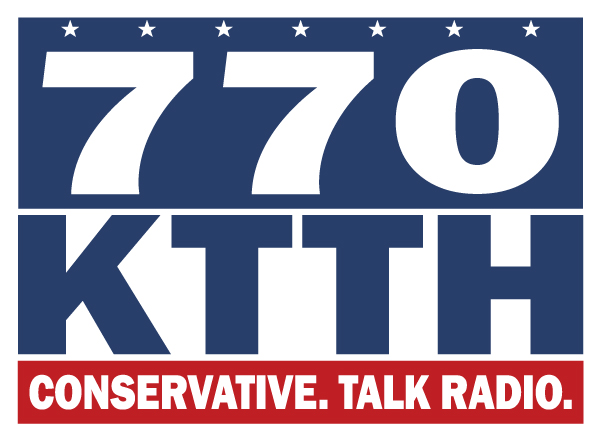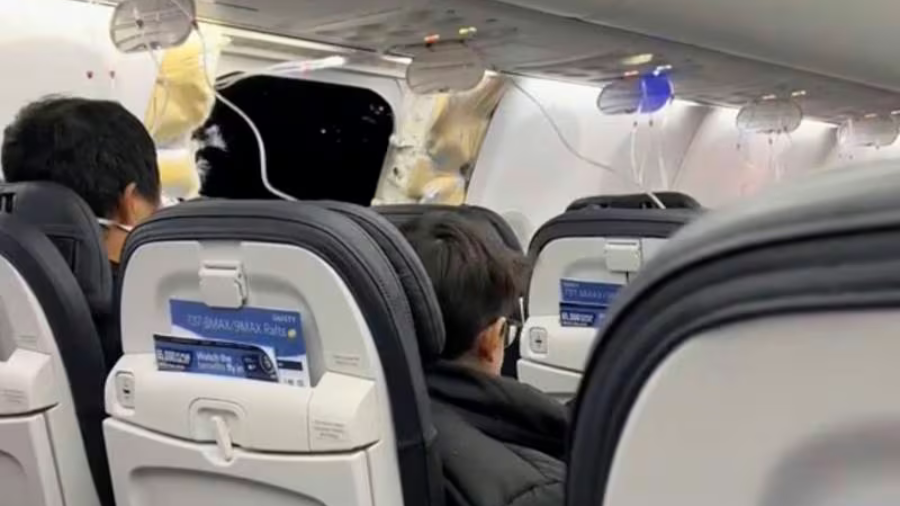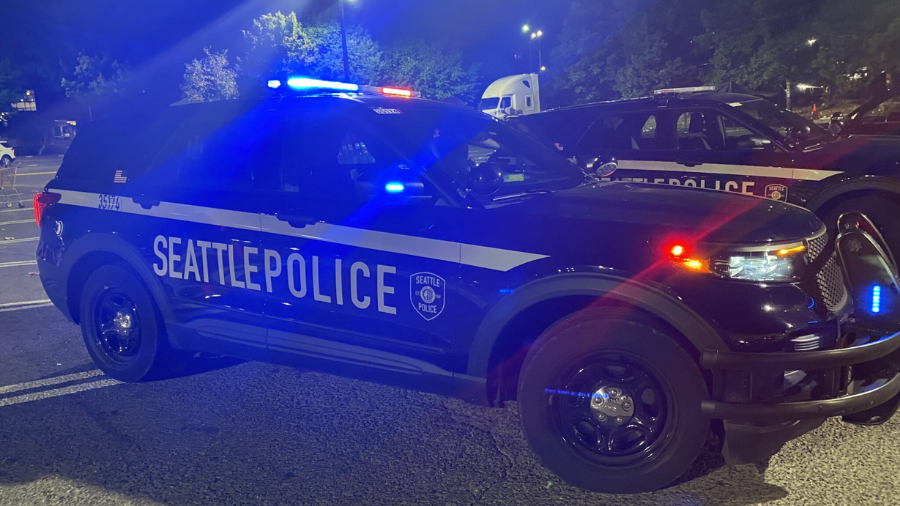Who won the KTTH $15 minimum wage debate?
Apr 10, 2014, 10:44 AM | Updated: 4:20 pm

KTTH host David Boze moderated a minimum wage debate Wednesday night - featuring (from left to right) Rebecca Smith, of the National Employment Law Project, Seattle Councilwoman Kshama Sawant, KTTH host Ben Shapiro, and Paul Guppy, of the Washington Policy Center. (Photo: Corky Trewin)
(Photo: Corky Trewin)
So, is the issue settled? Did conservatism trounce socialism at Wednesday night’s KTTH minimum wage debate at McCaw Hall at the Seattle Center?
· Listen to the full debate on KTTH.com
Not exactly. As with most debates, there was no clear winner, although the KTTH debate was an excellent showcase for the opposing ideologies – and the two sides even agreed on some points.
Socialist Seattle Councilwoman Kshama Sawant and Rebecca Smith, deputy director of the National Employment Law Project, argued in favor of the $15 wage. They focused on the injustice of large corporations that could afford to raise wages, but don’t, and rely on federal and state governments to subsidize wages with food stamps and Medicaid.
KTTH host Ben Shapiro and Washington Policy Center vice president Paul Guppy stuck to the economics of the issue – with Shapiro providing a lot of humor, too – and raised one important issue that’s been missing from the debate: consent. That is, that the employer-employee relationship is – and should remain – consensual; when the government interferes, the relationship becomes non-consensual.
For example, if an employer offers you $7.25 per hour – the federal minimum – you have the power to say no or ask for more. If the employer won’t give you more, you can decline the job. That’s consent.
However, Sawant and Smith said that there’s a power imbalance, where jobs that pay the minimum are the most common, and that it’s hard for an employee to turn down a job if they need money to live.
A pre-debate reception in a VIP area on the fourth floor of McCaw Hall allowed attendees to mingle with Shapiro, Boze, and Guppy. As waiters walked around serving glazed chicken wings, tiny hamburgers, and Caesar-salads-on-a-stick, tech entrepreneurs Jeff Gough and Dan Deering were excited for the debate. They hoped that Shapiro would rule on Sawant and Smith.
“I think [Shapiro] has the truth on his side – that’s a big advantage in this,” Gough said.
“We’re both small business owners, and we’re concerned about wage and tax issues. Over the years, we’ve become more educated on how wage laws work, so we’re interested in hearing a good debate,” Deering said.
Though they pay all of their employees more than $15 per hour, they said they did hire a high school student at $12 per hour to do work around their office. If minimum wage increased to $15, they said, it would not be worthwhile to hire someone like that, effectively limiting one person’s opportunity to gain work experience.
“[The $15 minimum wage] reduces opportunities,” Deering said.
Tyler and Mike Mullen, father and son, both from Bothell, said that they came to the debate for excitement, and were admittedly fans of the Boze and Shapiro shows on KTTH.
Tyler Mullen said that he wanted to give Sawant and Smith an opportunity to explain their position on the $15 wage before he makes up his mind on the issue – though he was skeptical of Sawant, and wanted to ask the councilwoman what her net worth is since she was formerly married to a Microsoft employee.
“Having a minimum wage at all is a bad idea,” Mike Mullen said. “It doesn’t give young people a place to start out. At $15 you’ll have more competition and no jobs for them at all.”
The debate began with a little after 7:30 p.m. with an act of truce by KTTH host and debate moderator David Boze.
“Can we all agree: we’d like to see people earn more money, and see less poverty?” Boze asked.
The four panelists agreed.
Boze acknowledged his bias against the $15 minimum wage, but said he sought help from KIRO FM morning news anchor Dave Ross in finding questions that would challenge the conservative position.
His first question did that, asking Shapiro why he objects to raising minimum wage if so many minimum wage workers rely on government entitlements to make ends meet.
“That’s 100 percent true,” Shapiro said. But, he said, raising the minimum wage would not end that practice. A better solution would be to cut those entitlements, forcing large companies to compete fairly.
Sawant responded by saying that big businesses are gaming the system “at the expense of small businesses.” But that the problem isn’t the entitlements, but the “problem of inequality” where “half of people eligible for food stamps are working people” and that “small businesses will benefit from having consumers” who can pay for their products.
“If we increase the minimum wage to $15, a family of three would get near zero in food stamps, relieving the problem,” Smith said.
The crowd was favorable toward Shapiro and Guppy, and showed support for them by grumbling loudly, jeering, or throwing up hands when they heard Sawant or Smith say something they didn’t like. However, there was a contingent of $15 Now supporters in the audience, though the crowd mostly drowned out their applause for Smith and Sawant.
In fact, the crowd got so loud at points that Shapiro had to wave them off so Sawant or Smith could finish a point.
“Sawant has guts for showing up to a venue with a crowd adverse to her position. It was an intellectually stimulating and passionate debate,” Shapiro said after the debate.
Before the debate, Toya Chester, an organizer with the $15 Now campaign, was operating a table in front of the debate hall. Chester noted that there were fewer $15 Now supporters than they usually see at events. She was also skeptical of the debate, wondering whether it was just a way to make fun of Sawant, socialism, and the idea of a high minimum wage.
“I’d like to ask if it’s fair for people to work full-time and still not be able to live [on the wages],” Chester said when asked what question she would ask of the opposing side. “Is it fair that companies are seeing record profits but there have been no record raises?”
One question from an audience member asked whether there’s a bipartisan consensus on minimum wage, since a national poll of Republicans and Democrats showed around 70 percent support for a raise.
Guppy responded, saying that there’s only a bipartisan consensus because the poll question is not “should we force all businesses to pay people $15?” but, “do you support businesses agreeing to increase the minimum wage?”
One of the final questions asked what happens if someone’s labor is not worth $15. What does an employer do then?
Smith said that wages are based on power, challenging the consent-labor pact Shapiro and Guppy talked about. Smith said that wages are based on employers having more power than employees do. The $15 wage can fix that imbalance. A metaphor that Shapiro used throughout the debate said that using government to increase the minimum wage, essentially, puts a gun to the temple of employers.
“I was glad that Councilwoman Sawant seemed to fully embrace her socialism, even espousing hunter-gatherer societies for their equality over modern inequality; I was disappointed, however, that her consistent ideology seemed to collapse when it came to implementation, making her a gradualist similar to her Democrat colleagues rather than the full-scale socialist she appears to be,” Shapiro said after the debate.
Jeff Gough and Dan Deering felt that the conservative side had won. Gough was skeptical of Sawant because, he said, she didn’t back up her points with data.
“The crux was the consensual vs. force,” Gough said.
“It seemed like there was more morality as opposed to [whether a $15 minimum wage] is good or bad for the economy,” Deering said.













